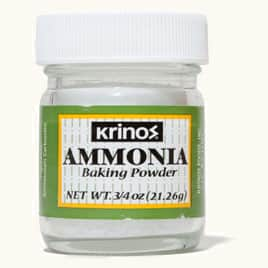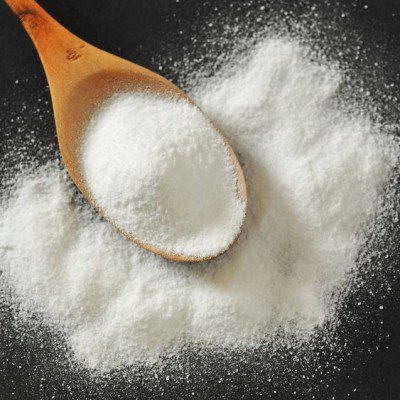
If you mix baking soda with an ammonium salt and add some water then you produce ammonia. In fact certain recipes for European and Middle Eastern cookies and crackers still call for it today.

It is an alternative to the commonly used baking soda and baking powder.
Is baking ammonia the same as baking soda. In respect to this is ammonia and baking soda the same. Nowadays baking soda and baking powder have widely replaced the use of bakers ammonia. However the same crisp texture and light fluffy composition cannot be achieved as well as from the utilization of bakers ammonia.
Secondly what is ammonia powder used for. Bakers Ammonia Ammonium Carbonate is a leavening ingredient called for in many old fashioned recipes. It is also called hartshorn.
Bakers Ammonia is used to make extra-crisp cookies or crackers. Unlike baking powder or soda it does not leave an alkaline off-flavor in baked goods. Is baking soda the same as ammonia.
It is important to understand that Ammonia and leaving agents such as Bakers Ammonia baking powder or baking soda are not the same as household ammonia which is a poisonous substance and should not be used with foods or baked goods. Is ammonia and baking soda the same. Bakers ammonia is an alkaline chemical leavening agent used in the baking industry.
It is an alternative to the commonly used baking soda and baking powder. Typically Bakers ammonia is associated with unique crispness and light texture in baked goods. Bakers ammonia also known as ammonium bicarbonate and often sold as ammonium carbonate was the primary leavening agent used by bakers before the advent of baking soda and baking powder in the 19th century.
In fact certain recipes for European and Middle Eastern cookies and crackers still call for it today. Because baking ammonia breaks down with heat to leaven foods its action is somewhat similar to most commercial double-acting baking powders. If you cant find baking ammonia you can substitute the same amount of commercial baking powder.
Baking ammonia or ammonium bicarbonate was used before the advent of baking soda and baking powder. It is a chemical leavening agent originally made from the horns of deer. The chemical formula is NH 4 HCO 3.
When heated baking ammonia breaks down into. The baking soda will behave like an acid and you will probably have small amounts of a sodium ammonium carbonate formed. If you mix baking soda with an ammonium salt and add some water then you produce ammonia.
I have done this repeatedly and I actually had a talk with the grocery store the other day over this. What is a substitute for baking ammonia. If you cant find any bakers ammonia but want to make a recipe that calls for it you can substitute baking soda.
Since bakers ammonia is a little more potent than baking soda youll need to add about 25 more soda to the mix. Baking ammonia or ammonium bicarbonate was used before the advent of baking soda and baking powder. It is a chemical leavening agent originally made from the horns of deer.
The chemical formula is NH4HCO3. Because baking ammonia gives off ammonia gas. Baking ammonia or ammonium bicarbonate was used before the advent of baking soda and baking powder.
It is a chemical leavening agent originally made from the ground antlers of deer. Hart is an Old English term for stag deer therefore baking ammonia is. You would make the ammonia even more basic than it already is which might make it too corrosive.
Strong bases can be very corrosive. I havent ever tried it but I wouldnt because I was taught not to mix things when I was still a child and I r. Which is the best method to clean the stove covers.
Check it out and see for yourselfFollow me on Instragram ReemachyCheck out recipeshttpswwwyoutube. Baking soda is a leavening agent used in baked goods like cakes muffins and cookies. Formally known as sodium bicarbonate its a white crystalline powder that is naturally alkaline or basic.
Bakers ammonia properly known as ammonium carbonate is another commonly used substitute for baking soda but its usually best to only use it with smaller baked goods instead of large or dense cakes.